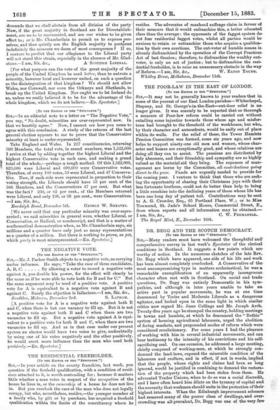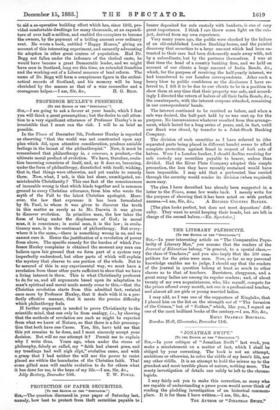DR. BEGG AND THE SCOTCH DEMOCRACY.
[TO THE EDITOR OF THE " SPECTATOR."]
SIR,—Many readers must have welcomed the thoughtful and comprehensive survey in last week's Spectator of the clerical conditions in Scotland. It suggests a few points which are- worthy of notice. In the numerous sketches of the late Rev.- Dr. Begg which have appeared, one side of his life and work has been almost completely overlooked. A Conservative of the- most uncompromising type in matters ecclesiastical, he was a remarkable exemplification of an apparently incongruous• character often met with in Scotland. On social and trade• questions, Dr. Begg was entirely Democratic in his sym- pathies, and although in later years unable to take an active part in popular movements, he was at one time denounced by Tories and Moderate Liberals as a dangerous agitator, and looked upon in the same light in which similar critics now regard Mr. Jesse Collings and Mr. Joseph Arch. Twenty-five years ago he stumped the country, holding meetings- in towns and hamlets, at which he denounced the " Bothie" system of housing agricultural labourers, urged the abolition of feeing markets, and propounded modes of reform which were- considered revolutionary. For some years I had the pleasure- of working with him in several industrial movements, and can bear testimony to the intensity of his convictions and his self- sacrificing zeal. On one occasion, he addressed a large meeting,. chiefly composed of working-men, at which he strongly con- demned the land-laws, exposed the miserable condition of the labourers and crofters, and in effect, if not in words, implied. that the people, whose rights and claims had been so long ignored, would be justified in combining to demand the restora- tion of the property which had been stolen from them. He advocated Trades Unions, when to do so was a social discredit, and I have often heard him dilate on the tyranny of capital and the necessity that workmen should unite in the protection of their highest interests. When the Edinburgh improvement schemes had removed many of the poorer class of dwellings, and over- crowding was all-prevalent, Dr. Begg was one of the very few to aid a co-operative building effort which has, since 1862, pro- vided comfortable dwellings for many thousands, at an expendi- ture of over half-a-million, and enabled the occupiers to become the owners, by the payment of a trifling amount over ordinary rent. He wrote a book, entitled " Happy Homes," giving au account of this interesting experiment, and earnestly advocating its adoption in other great centres of population. Had Dr. Begg not fallen under the influence of the clerical caste, he mould have become a great Democratic leader, and we might have seen in Scotland, long ere this time, an extended franchise and the working-out of a Liberal measure of land reform. The name of Dr. Begg will form a conspicuous figure in the ecclesi- astical records of Scotland, and his memory will be long cherished by the masses as that of a wise counsellor and a
-courageous helper.—I am, Sir, &c., H. G. REID.











































 Previous page
Previous page